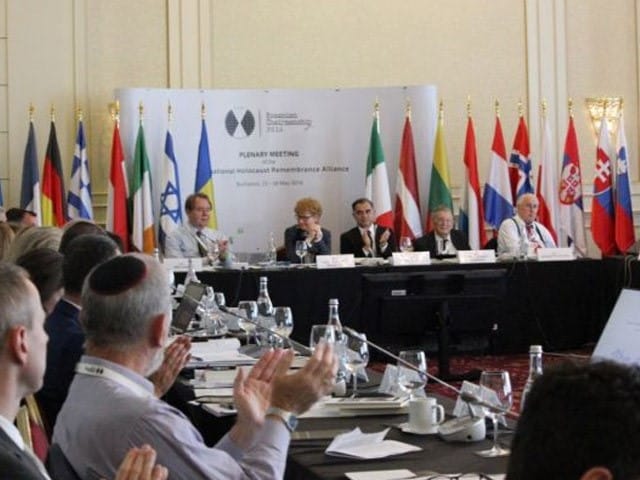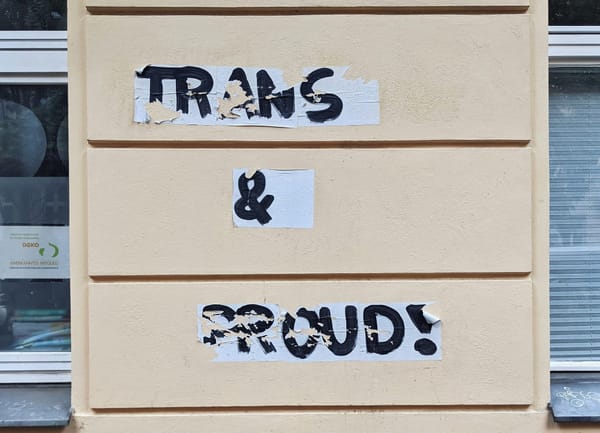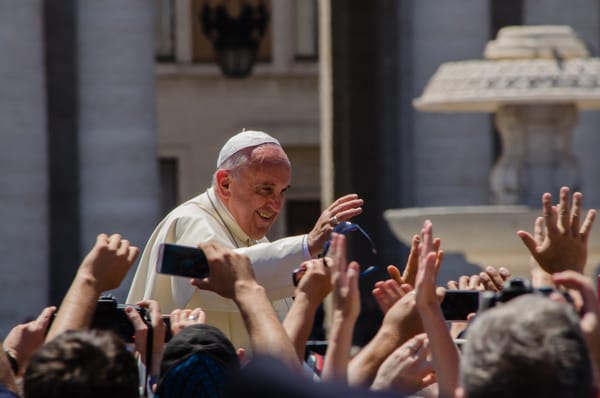Israel is using the IHRA to silence its critics
A network of government-funded NGOs are pushing the definition in an effort to redefine antisemitism and quash Palestinian dissent.

The IHRA definition of antisemitism has resurfaced in the British news cycle after Education Secretary Gavin Williamson threatened to cut funding to any university that did not adopt it, while its opponents maintain that it stifles legitimate criticism of Israel.
In the UK, the IHRA has become inextricably associated with Labour’s antisemitism controversy. Fresh on the heels of the mural incident in March 2018, the row over Labour’s adoption of the definition became the first allegation against Jeremy Corbyn that transcended the ‘guilt-by-association’ paradigm. Labour’s IHRA row was afforded symbolic status: if Jeremy Corbyn did not bend to the will of a distressed community’s attempts to define racism against it, the repeated claims of obstinacy, blind spots, and even racism would be proven true.
By the time Labour agreed to adopt the definition in full, the ambiguous, quasi-legal definition was already in effect well beyond the party. In recent years, Tower Hamlets Council in London refused to authorise ‘The Big Ride for Palestine’ solidarity event due to concerns that it might be in breach of the IHRA. Both Manchester University and the University of Lancashire cancelled Israel Apartheid Week events for the same reason. Regarding the latter, the right-wing lobbying group, UK Lawyers for Israel cited as evidence of antisemitism the very IHRA examples around which Corbyn’s Labour expressed concern, saying: “These events typically apply double standards towards Israel that are not applied to other countries and effectively deny Israel any right to exist by treating it as an inherently racist endeavour. As such, they conflict with the IHRA definition.”
Such censorship is increasingly common given the existence of a network of NGOs dedicated to quashing criticism of Israeli policy; the U.S. is already much further down the road when it comes to obstructing Palestinian advocacy using allegations of antisemitism. It is little wonder that Kenneth Stern, who authored the definition, has openly criticised the way its usage has contributed to a “chilling and McCarthy-like” atmosphere, especially on campuses. His concerns are put into sharp focus when one examines how the Israeli government and its network of auxiliary NGOs exploits the definition.
Israel’s blunt instrument
Many debates surrounding the IHRA — its precise legal and operational reach, the relationship between the definition and the appended examples, and the precise contours between antisemitism and anti-Zionism — quickly fade into insignificance when compared with the way it has been implemented by Israel and its allies abroad.
While leading legal scholars have cast doubt on the IHRA’s basis in law, a report by Tel Aviv-based International Legal Forum (ILF) see’s its efficacy as an instrument that can be wielded to ostracise those who don’t fall into line. “Even without legal force, IHRA allows us to properly identify antisemitism and antisemitic actions. Antisemitism can then be subject to the proper response from society, which is rejection and condemnation”, the ILF report’s authors note.
In September 2020, ILF, alongside several others organisations, held a digital conference entitled ‘Fighting Antisemitism From Words to Action.’ Within minutes of commencing the conference, host Yifat Segal pointed to the IHRA definition. “Look how powerful it can be,” she says, and it’s “a long way” from reaching its full potential. For Segal, the IHRA’s appeal lies in its expansion of antisemitism from a hatred of Jews because they are Jews, to include “delegitimisation of the Jewish people” under the conceptual framework of ‘new antisemitism’.
The ILF is part of a growing network of right-wing NGOs who are pushing the adoption of IHRA with the primary goal of quashing Palestinian dissent. It works in close collaboration with, and receives extensive funding from, Israel’s Ministry of Strategic Affairs and Public Diplomacy, which in 2015 was granted “responsibility to act against the delegitimization and boycott campaigns against the state of Israel.”
Israel has always understood that state propaganda is most effective when it is outsourced to non-state actors, both inside and outside the country. The ministry’s website explicitly states that it is mandated to “strengthen the activities of civilian bodies operating in the field,” and, even more explicitly, to “represent the government’s position with regard to the campaign vis-a-vis non-governmental organisations in Israel and around the world, and work with them to advance the objectives of the campaign its strategies.” This strategy was evident when the government peddled anti-BDS propaganda to Israeli media outlets who republished it wholesale for vast sums of money. The proliferation of these ideas has in turn emboldened 120 right-wing NGOs (including a pro-Bolsonaro super-church accused of extreme antisemitism and conducting fatal exorcisms) to publicly insist Facebook adopt the IHRA definition. Israel’s Minister of Strategic Affairs and Public Diplomacy, Orit Farkash-Hacohen, proclaimed at the ILF conference that she has met Facebook and TikTok representatives, and is in “dialogue” with Twitter about taking “the classic IHRA definition and to see how we can adjust it to social media.”
Later on at the same conference, the fruits of this approach were proudly displayed. Gideon Falter, Chairman of the UK-based Campaign Against Antisemitism, held up the example of Jeremy Corbyn to demonstrate the efficacy of the IHRA: “We were able to use the definition to demonstrate that he is an antisemite thanks to the support of a “massive media campaign.”
Compromising Jewish safety to attack Palestinians
Israel is increasingly willing to form Faustian pacts with right-wing populists in exchange for their support, revealing a growing chasm between perceived Israeli and diaspora Jewish safety. Against the backdrop of the biggest rise in antisemitic incidents in the US in over forty years, including two synagogue shootings by white supremacists, Israel’s Benjamin Netanyahu maintains that there is “no greater supporter of the Jewish people than President Donald Trump.”
In Israel’s Knesset, Blue and White Party MK Michal Cotler-Wunsh marked the two-year anniversary of the Tree of Life Synagogue massacre by calling for the adoption of the IHRA to prevent the demonization of Israel, saying: “It is imperative that the IHRA definition of anti-Semitism is utilised, in its entirety, to address this gap in knowledge and to educate on what anti-Semitism is and its various manifestations.” While they should be adopting measures to prevent the spread of a far-right antisemitism motivating massacres against Jews abroad, Israeli legislators are instead obsessively concerned with deflecting criticism of their country’s treatment of Palestinians.
As well as misdiagnosing antisemitism and cozying up with the far-right, Israel is inviting bona fide accusations of dual loyalty by leveraging diaspora Jewry in its crusade to protect itself from criticism. A 2015 action plan for combating antisemitism authored by Israel’s Foreign Affairs Ministry failed to mention anti-Semitism as a phenomenon that exists independently of anti-Israel sentiment, yet the Jewish diaspora are cast as “soldiers in a political war”, patrolling under the umbrella of “our iron dome.”
Not just silence but surrender
At the ILF conference, Farkash-Hacohen issued a hollow caveat: “I have nothing against criticism or freedom of speech of the State of Israel. On the contrary, I am against incitement, disguised antisemitism, and denying the right of Israel to exist as a Jewish state.” Her garbled words are a mirror image of a definition that cannot distinguish between legitimate and illegitimate criticisms of Israel.
How then, in her eyes, should Palestinians resist Israeli subjugation? Violence, even directed against legitimate combatants, is met with widespread outrage. In the besieged enclave of Gaza, grassroots demonstrations are met by Israeli forces with disproportionate force that maim and kill scores of Palestinians, to the sotto voce chorus of international condemnation. In the West Bank, the IDF conducts night-raids, enforces restrictions on freedom of movement and detention without trial, including administrative detention for minors. Within the 1948 borders, police brutality is rife and according to Israel’s 1958 Basic Law, no party may run for Knesset if it negates “the existence of the State of Israel as a Jewish and democratic state.” Meanwhile, any diplomacy or recourse to justice for Palestinians from the International Criminal Court is blocked off.
Yet cornering Palestinians under Israel’s rule is not enough; their right to freedom of expression is also under attack. What is left for Palestinians to do? They are boxed into an ever-shrinking space where even a whispered utterance of their own narrative is met with allegations of antisemitism or terrorism. It is clear that Israel is demanding unconditional surrender from the Palestinians; not only must they concede defeat, they must also tacitly accept an ideology that has stripped them of their rights.
More than this, the Right’s adoption of antisemitism as a pet cause and its devotion to the IHRA definition is part of a broader cultural and political battle against civil society work. When the State Department attacked Amnesty International, Oxfam, and Human Rights Watch, as anti-Semitic, they cited the definition as evidence.
No definition, however watertight, can serve as an adequate replacement for anti-racist education, including an understanding of the tangled relationship between antisemitism and anti-Zionism. But a definition that trades Jewish safety for Palestinian silence is not one worth having. Some liberal Zionist groups in the USA are starting to speak out after witnessing the chilling effects of the IHRA, it is high time that British Jews joined them. ▼
Jonathan Shamir is a writer and editor at Haaretz.




